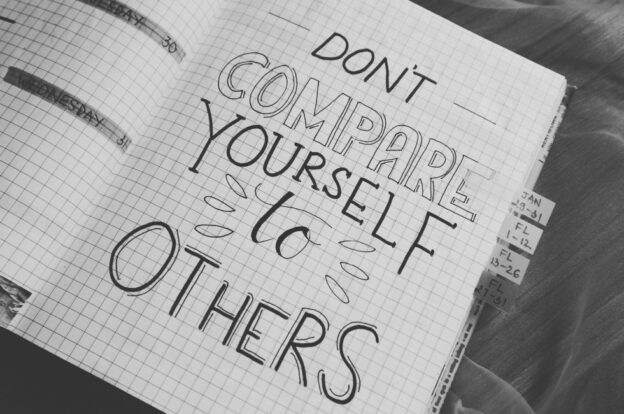You may have heard the old phrase, “Comparison is the thief of all joy.” Have you ever really thought about how true it is? Comparison is terrible for your mental health and can lead to chronic sadness, depression, and poor self-esteem. Comparison is to look outside of ourselves, take into account what someone else has, and feel inadequate as a result. It’s essentially a toxic way of thinking that can cause you to overlook all the good things in your life.
The good news is that while self-comparison is a difficult habit to break, it is possible. Learning to break this habit can dramatically improve your mental health and allow you to start living the satisfying life that you deserve.
How Does Self-Comparison Occur?
A little healthy competition is never a bad thing. However, when it reaches a point where you are never able to enjoy or celebrate your own success, it becomes a problem. You might not realize how early in life or how innocently self-comparison starts. It can start when you’re just a little kid and you see that another child has something that you don’t. It could be as simple as being envious of a toy they have.
As you grow into a teenager, it can become a lot deeper. You may be envious of others’ appearances, how many friends they have, how many followers they have on social media, or even of the clothes they wear. You may ask yourself,
“Why can’t I look more like them?” or “Why don’t I have as many friends as they do?”
In adulthood, comparison can become even more serious. You may compare yourself to those who have a certain career that you want. You could look at others who are married or have children and question why you’re not at that place yet. When you begin thinking like this, you may start questioning yourself, feeling as if there is something wrong with you, and feeling shame or inadequacy as a result.
Why Is Self-Comparison So Toxic?
Part of why self-comparison is so toxic is that it is often illogical because you don’t have all the parts of the story. Everyone is on a different path in life. Everyone has different setbacks and advantages. Maybe that person that has your dream job got there because they had a special connection that you didn’t have while you’ve been working your way up on your own. Or maybe that person that seems to have the perfect life on social media and has all the followers is dealing with some major challenges that they aren’t talking about online.
So much self-comparison stems from social media. What people tend to forget is that social media is often just a highlight reel of people’s lives. It’s the happy moments and the successes. People don’t usually post when they’ve suffered a disappointment, setback, or loss. They are probably not going to post about their bad days. But when you look at their accounts and see only the good things, it is easy to see a fabricated version of someone’s life. This is why social media should really only be taken with a grain of salt.
Another reason that self-comparison is so toxic is that it keeps you from being grateful for the good you have in life. When you are constantly looking ahead and wanting more, you’re not thinking about all the things you have accomplished in your own life.
How Do I Stop Comparing Myself to Others?
Comparing yourself to others is a bad habit, but it’s one that you can break. Likewise, you’ll feel a lot better when you do. The key is becoming more aware of your own thoughts. When you start to get into a cycle of comparison, negative thinking, or self-pity, make a conscious effort to stop yourself. Redirect your thoughts to something positive. For example, think about something that you recently accomplished that you’re proud of and allow yourself to soak up and really enjoy that feeling of satisfaction and pride.
You can also just think about something in your life that brings you great joy – for example, your family members, friends, or even good health. These are things that are so valuable but often overlooked.
Something else that you can do to change your way of thinking is to make a conscious effort to practice gratitude. You can start by creating a gratitude journal. Every night before you go to bed or when you first wake up in the morning, write down three things that you’re grateful for. It can be something good that has recently happened or a goal that you recently reached. It can even be as simple as having food on the table or a roof over your head. Before long, gratitude will come more naturally.
Self-comparison is a very easy habit to fall into, but it is also very damaging and can take a toll on your mental health. It can lead to chronic sadness, depression, and low self-esteem. It can keep you from acknowledging and celebrating the good things going on in your own life because you’re always desiring what someone else has. This is a dangerous cycle, but it is possible to break. The key is becoming more aware of your thoughts and stopping yourself when you begin to fall into negative thinking. It can also help to practice gratitude. If you’re struggling with substance use disorder, our team at The Ho Tai Way can help. Call (714) 881-8931 today.









